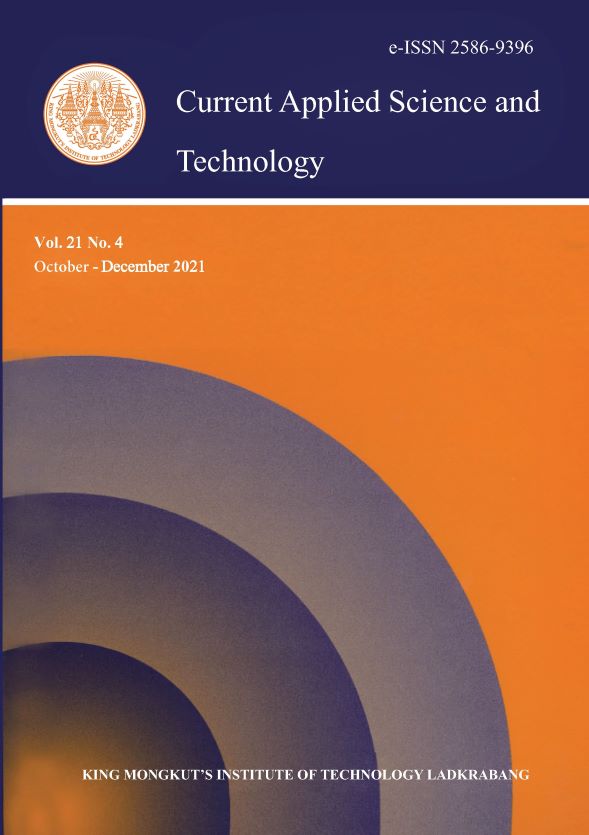An Assessment of Privacy Concerns on Personal Health Information: Thailand Case Study
Main Article Content
Abstract
One of the most important industries that transforms into digital infrastructure is healthcare. Most healthcare organizations worldwide collect and process personal health information digitally. Personal health information is considered highly sensitive information. Hence, the increased collection of health information has raised concerns throughout society regarding potential privacy issues. Therefore, previous research paid attention to the study of privacy of health information in several contexts. In Thailand, Thai people are becoming more aware of privacy concerns than ever before. The reason is that the personal data protection act will become effective in May 2021. Hence, this study aims to understand the privacy concerns and behavioral intention to reveal Thais’ personal health information. In this paper, we applied the Internet Users’ Information Privacy Concerns model to the health information context. We collected data using an online questionnaire. The population consisted of Thai people who shared personal health information with the healthcare industry. The participants in this research were selected by the accidental sampling method. There were 84 participants in Thailand who were employed in the hypotheses testing using the linear regression equations. This study shows that personal health information collection and awareness directly influence personal health information privacy concerns. Furthermore, trusting belief is a factor that affects people’s behavioral intention to share health information. The findings should help the healthcare industry to better understand the patients, so that they will offer their information willingly.
Keywords: GDPR; health information; IUIPC; PDPA; privacy concern; privacy
*Corresponding author: Tel.: (+66) 061-0509991
E-mail: waransanang.s@ubru.ac.th
Article Details
Copyright Transfer Statement
The copyright of this article is transferred to Current Applied Science and Technology journal with effect if and when the article is accepted for publication. The copyright transfer covers the exclusive right to reproduce and distribute the article, including reprints, translations, photographic reproductions, electronic form (offline, online) or any other reproductions of similar nature.
The author warrants that this contribution is original and that he/she has full power to make this grant. The author signs for and accepts responsibility for releasing this material on behalf of any and all co-authors.
Here is the link for download: Copyright transfer form.pdf
References
European Union, 2019. Complete Guide to GDPR Compliance. [online] Available at: https://gdpr.eu/
EUR-Lex, 2019. Regulation (EU) 2016/679 of the European Parliament and of the Council. [online] Available at: https://eur-lex.europa.eu/legalcontent/EN/TXT/HTML/
Thai Government, 2019. Personal Data Protection Act. [online] Available at: https://drive.
google.com/open?id=1MzGNi3kdDPA0E52n8bDybeuDNklM8xJe.
HIQA, 2017. Privacy Impact Assessment Toolkit for Health and Social Care. [e-book] Dublin: Health Information and Quality Authority.
WP29, 2016. Article 29 - Data Protection Working Party. [Online] Available at: https://ec.europa.eu/newsroom/document.cfm?doc_id=44137.
Theera-ampornpunt, N., 2009. Medical Informatics: A Look from USA to Thailand. [Online]. Available at: https://scholar.google.co.th/scholar?hl=th&as_sdt=0%2C5&q=Medical+Infor
matics%E2%80%AF%3A+A+Look+from+USA+to+Thailand&btnG=
Malhotra, N.K., Kim, S.S. and Agarwal, J., 2004. Internet users’ information privacy concerns (IUIPC): The construct, the scale, and a causal model. Information Systems Research, 15(4), 336-355.
Altman, I., 1977. Privacy regulation: Culturally universal or culturally specific? Journal of Social Issues, 33(3), 66-84.
Solove, D.J., 2002. Conceptualizing privacy. California Law Review, 90(4), 1087-1155.
Margulis, S.T., 1977. Conceptions of privacy: Current status and next steps. Journal of Social Issues, 33(3), 5-21.
Margulis, S.T., 2003. Privacy as a social issue and behavioral concept. Journal of Social Issues, 59(2), 243-261.
Bennett, C.J., 1995. The Political Economy of Privacy: A Review of the Literature. University of Victoria, Department of Political Science, Victoria.
Westin, A.F., 2003. Social and political dimensions of privacy. Journal of Social Issues, 59(2), 431-453.
Okazaki, S., Molina, F.J. and Hirose, M., 2012. Mobile advertising avoidance: exploring the role of ubiquity. Electronic Markets, 22(3), 169-183.
Kusyanti, A., Puspitasari, D.R., Catherina, H.P.A. and Sari, Y.A.L., 2017. Information privacy concerns on teens as Facebook users in Indonesia. Procedia Computer Science, 124, 632-638.
Sipior, J.C., Ward, B.T. and Connolly, R., 2013. Empirically assessing the continued applicability of the IUIPC construct. Journal of Enterprise Information Management. 26(6), 661-678.
Pape, S., Ivan, A., Harborth, D., Nakamura, T., Kiyomoto, S., Takasaki, H. and Rannenberg, K., 2020. Re-evaluating internet users’ information privacy concerns: the case in Japan. AIS Transactions on Replication Research, 6(18), 1-18.
Angst, C.M. and Agarwal, R., 2009. Adoption of electronic health records in the presence of privacy concerns: The elaboration likelihood model and individual persuasion. MIS Quarterly, 33(2), 339-370.
Commission Nationale de l’Informatique et des Libertés, 2018. Privacy Impact Assessment (PIA) Methodology. [online] Available at: https://www.cnil.fr/en/privacy-impact-assessment-pia
Campbell, A.J., 1997. Relationship marketing in consumer markets: A comparison of managerial and consumer attitudes about information privacy. Journal of Direct Marketing, 11(3), 44-57.
Santos, J.R.A., 1999. Cronbach’s alpha: A tool for assessing the reliability of scales. Journal of extension, 37(2), 1-5.
Nunnally, J.C., 1994. Psychometric theory 3E. New Delhi: Tata McGraw-hill Education.
Hair, J.F., Anderson, R.E., Tatham, R.L. and Black, W.C., 1998. Multivariate Data Analysis. 5th ed. Upper Saddle River: Prentice Hall.
Tabachnick, B.G. and Fidell, L.S., 2007. Using Multivariate Statistics. Boston: Pearson.
Pallant, J., 2020. SPSS Survival Manual: A Step-by-Step Guide to Data Analysis using IBM SPSS. 7th ed. Milton: Routledge.
Allen, P.J. and Bennett, K., 2007. SPSS for the Health and Behavioural Sciences. South Melbourne: Thomson Learning.
Field, A., 2009. Discovering Statistics Using SPSS. 3rd ed. London: SAGE Publications Ltd.


